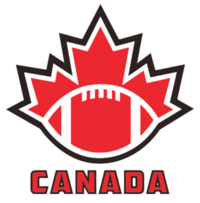Football Canada
Football Canada is the governing body for amateur Canadian football. It is Canada's representative member of the International Federation of American Football (IFAF), the world's governing body for American football, although it focuses primarily its own Canadian form of the game. Football Canada is headquartered in Ottawa, Ontario.
 | |
| Formation | 1880 |
|---|---|
| Type | National Sport Organization |
| Headquarters | Ottawa, Ontario |
Membership | Paid by individual, team and/or league |
Official languages | English and French |
President | Jim Mullin[1] |
Key people | Shannon Donovan (Executive Director), |
| Website | footballcanada.com |

History
The organization now known as Football Canada was founded on June 12, 1880 as the Canadian Rugby Football Union, revived on February 7, 1884 and re-organized as the Canadian Rugby Union on December 19, 1891.
The CRU was founded to govern a sport which at the time had rules similar to the rugby football being played in the United Kingdom. In 1909, Albert Grey, 4th Earl Grey, then Governor General of Canada, donated a trophy to the CRU to be awarded for the Rugby Football Championship of Canada. This trophy became known as the Grey Cup.
Even by this time however, the rules being played in Canada were vastly different from the rules used in countries that were part of the International Rugby Board (IRB). In the years that followed, the CRU made numerous rule changes that resulted in a game reasonably similar to the American one, but unrecognizable to a rugby union enthusiast.
Despite the divergence, the sport continued to be referred to as rugby for many years, and the CRU did not change its name despite the obvious confusion. By the 1940s, however, another development was to cause further changes to the CRU's mandate. It was now clear that two of its member leagues, the Interprovincial Rugby Football Union in eastern Canada and the Western Interprovincial Football Union in the West were far more competitive than other circuits. By the 1950s, the two major unions had become openly professional, and in 1956 formed the Canadian Football Council (CFC) as an umbrella organization. In 1958, the CFC seceded from the CRU and became the Canadian Football League, which assumed control of the Grey Cup (though the amateurs had effectively been locked out since 1954).
As an organization with no direct jurisdiction over the professional clubs and having become a distinct sport from rugby union by this time, the CRU finally changed its name to the Canadian Amateur Football Association (CAFA) in 1967. The CAFA changed its name again, to Football Canada in 1986. In French, its name had long been Football Canada.
As of 2005 Football Canada is primarily responsible for running amateur football in Canada, including the national amateur football championships. It is actively trying to foster closer working relationships with both the CFL and the National Football League.

Members
- British Columbia Provincial Football Association
- Football Alberta
- Football Saskatchewan
- Football Manitoba
- Ontario Football Alliance
- Football Quebec
- Football New Brunswick
- Football Prince Edward Island
- Football Newfoundland and Labrador
- Football Nova Scotia
National Championships
- Football Canada Cup
- Flag Football National Championships
- 6 Nations Challenge
- Women's Challenge Cup
National Teams
Men's
- Junior National Team
- Senior Flag Football National Team
Women's
- Women's National Team
- Senior Flag Football National Team
Former National Teams
- Senior National Men's Team
International Bowl Series
First played in 2014, the annual International Bowl series is a collaboration between Football Canada and USA Football featuring a series of exhibition games between the rival football nations in Texas in January and February. The event built on the previous International Bowl (2010 – 2013) format of Team USA vs. Team World.
Canada's under-18 team for the International Bowl is selected from the top players and coaches at the prior summer's Football Canada Cup.
National Coaching Certification Program
Football Canada offers coaches training through the National Coaching Certification Program (NCCP) for flag, touch and tackle football.
NCCP Streams
- Community Sport
- Competition-Introduction
- Competition-Development
Safe Contact
As part of its NCCP program, Football Canada's Safe Contact module teaches Safe Contact Tackling and Blocking as well as concussion education. In 2014, the organization partnered with the Canadian Football League to further refine the program.[2]
Champions prior to 1909
These are the CRU champions before the dedication of the Grey Cup.
- 1892 – Osgoode Hall (Ontario) defeated Montreal (Quebec)
- 1893 – Queen's University (Ontario) defeated Montreal (Quebec)
- 1894 – Ottawa University (Quebec) defeated Queen's University (Ontario)
- 1895 – Toronto University (Ontario) defeated Montreal (Quebec)
- 1896 – Ottawa University (Quebec) defeated Toronto University (Ontario)
- 1897 – Ottawa University (Quebec) defeated Hamilton (Ontario)
- 1898 – Ottawa (Ontario) defeated Toronto University (Intercollegiate), Ottawa (Ontario) defeated Ottawa University (Quebec)
- 1899 – No game.
- 1900 – Ottawa (Ontario) defeated Brockville (Quebec)
- 1901 – Ottawa University (Quebec) defeated Argonauts (Ontario)
- 1902 – Ottawa (Ontario) defeated Ottawa University (Quebec)
- 1903 – No game.
- 1904 – No game.
- 1905 – Toronto University (Intercollegiate) defeated Ottawa (Quebec)
- 1906 – Hamilton (Ontario) defeated McGill University (Intercollegiate)
- 1907 – Montreal (Interprovincial) defeated Peterborough (Ontario)
- 1908 – Hamilton (Interprovincial) defeated Toronto University (Intercollegiate)
The 1909 game was the first game for the Grey Cup. See the article 'List of Grey Cup champions' for the complete Grey Cup listing.
Source: Ottawa Citizen, November 28, 1910, page 8.
See also
- Canadian Football
- U Sports football
- U Sports
- Canadian Colleges Athletic Association
- Canadian Junior Football League
- Quebec Junior Football League
- Rugby Canada
- Canadian Football League
- Comparison of Canadian and American football
